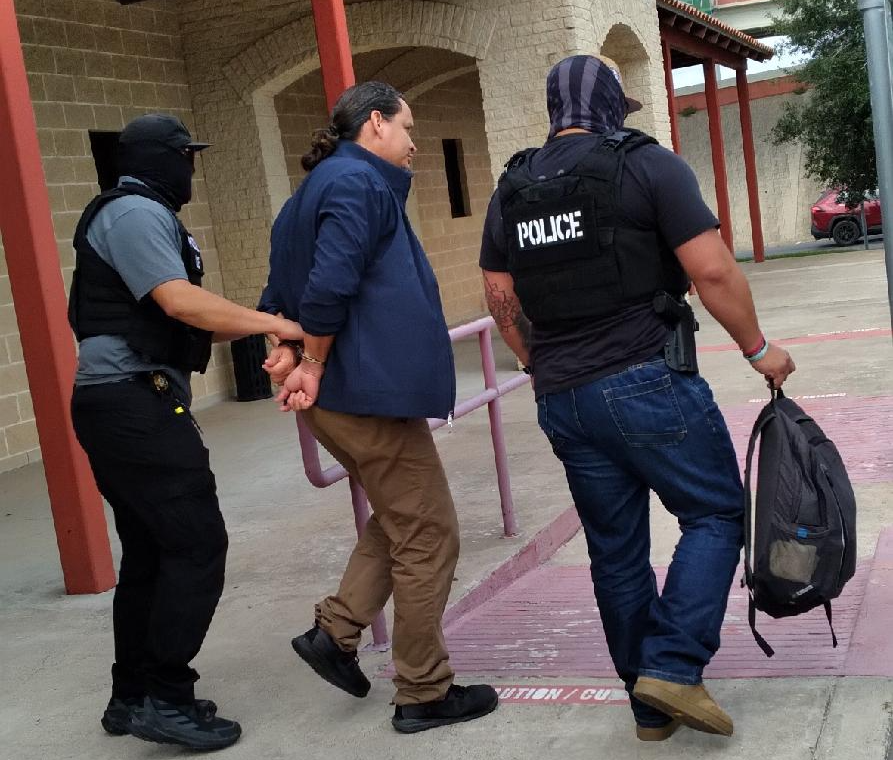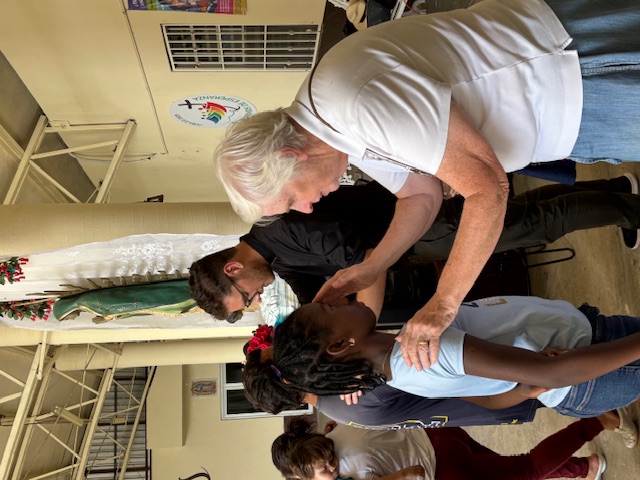“Do they know this is just a farce?” This is what Rose Patrice Kuhn, I.H.M., asked after we witnessed Immigration and Customs Enforcement detain a man right outside of immigration court in Harlingen, Texas. Carlos, a Nicaraguan, was in the process of requesting asylum and had just been tricked out of his right to due process. He was now in an ICE van headed for deportation, even though he explicitly mentioned in court that his life would be at risk in Nicaragua because of his political activism.
We knew this was a possibility, as our colleagues have witnessed this outcome becoming common across the country. We were two Jesuits present with Sister Rose to accompany individuals who had shown up for their scheduled court appearances. We hoped to offer comfort, a prayerful presence and potentially deter this result, which, from our perspective, is a complete embarrassment to the justice system and an affront to human dignity.
Fast-tracking deportation
Many migrants who are being targeted for deportation right now legally entered the country during the last two years of the Biden administration, using a government-run smartphone app called CBP One. This was a legal process that served as a sort of “line,” through which 900,000 migrants received appointments to present themselves at the U.S. border, where they could access the asylum process and enter the country to pursue long-term residency status.
At the time of their appointments, those individuals were given the legal classification of “arriving alien,” which is given to most noncitizens who come to a border crossing without a visa or a green card. They were then allowed to enter the United States for a temporary two-year humanitarian parole period, were immediately eligible for work authorization and were eligible to request asylum. They were also immediately placed into immigration proceedings to determine if they were removable or if they were likely eligible to remain in the United States when their parole ended.
In April, the Trump administration revoked these migrants’ parole and is now seeking to deport them. Essentially, people who came into the country following the rules are now being targeted for deportation.

In an effort to speed up deportations, the Trump administration expanded the use of a process called “expedited removal,” fast-tracking the deportation of anyone who was designated an “arriving alien” when they entered the United States.
The only safeguard for many migrants is that, if they have an open case in immigration court, they cannot be placed in “expedited removal.” But the Trump administration has found a way around this safeguard. The Department of Homeland Security has started showing up at immigration courts and submitting a motion to dismiss their case. If the judge agrees, it immediately opens the door for ICE to place a claimant in expedited removal.
A breakdown of justice
When Carlos’s hearing began, the first 25 minutes seemed to be moving in a positive direction. The judge answered his questions patiently and thoroughly, telling him what he needed to do for the best outcome. She encouraged him to continue bolstering his case for asylum, which is most people’s best shot for a legal path to citizenship or legal residence. She gave him a whole year to put together his case and find an attorney before the next court date, which she scheduled for August 2026.
Just when the case was about to be adjourned, the judge asked the prosecuting attorney from D.H.S., who had been silent up until that point, if he had anything to add. He moved to dismiss the case, making Carlos vulnerable to immediate deportation.
In a matter of minutes, this is precisely what transpired. While Carlos clearly stated that he wanted to continue pleading his asylum case, the judge accepted the motion and dismissed the case.
An undercover ICE official who was present in the courtroom then texted another undercover ICE agent who was in the lobby to alert them that Carlos was leaving the courtroom and that he, as of a few minutes ago, had no legal status in the United States. As we walked out of the courtroom with this man, our colleagues got his and his family’s contact information and prepared him for what was about to happen.
When we walked out of the building, Carlos was immediately approached by two masked ICE agents, who handcuffed him and put him in the van.
To see before our eyes this breakdown of justice was appalling. The undercover nature of the ICE operation exposes the entire process for what it is: shameful.
We share this story not because it is unique but because it is becoming normal. This type of kangaroo court, where the appearance of justice is kept by patient, robed individuals scheduling fictitious future court dates, betrays the dignity of our migrant brothers and sisters.
When we returned later that same day for the afternoon docket, more individuals were nervously waiting for their hearings to begin. We sat with them and, along with our colleagues from the pro bono legal presentation group ProBAR, advised them on the potential outcomes of the afternoon.
Many of these people were terrified. We were terrified. To sit in the halls of justice and expect anything but is a chilling feeling. We prayed with these people and their families. Sister Rose kept repeating to them, “Tú eres tan valiente.” “You are so brave.”
She reminded them that their bravery is what led them to come to the United States searching for a better life for their families. It is what sustained them now amid their fear. And it is what made America better, privileged to have them in this country.
One woman wore a gold sequined T-shirt that read: “Let your faith be greater than your fear.” When we mentioned her shirt, she asked in Spanish: “What does it say? I can’t read English.” When we translated it, a smile broke out on her face. She had changed shirts that morning, and we all felt it was providential, a message we all needed to hear.
For some reason, the undercover ICE agents were not present for the afternoon docket. It is unclear why, since in the last couple of weeks, ICE has been present throughout the day, detaining people morning and afternoon.
It is possible that our religious accompaniment and our filming of the earlier incident led to a change of course for that day. We can’t be sure. What we are unfortunately sure about is that this deplorable process will continue and is playing out at immigration courts across the country right now.
What must be done
“Do they know this process is a farce?” Sister Rose’s question is a good one for all of us, but it is difficult to be confronted with. We don’t share this story to shame individuals—the judge, the prosecutor, the D.H.S. or even the ICE agents. Many people who work for ICE are themselves in a working-class job and are often members of the parishes we attend. Some of these agents may very well hate this situation as much as we do.

Nevertheless, the question stands: Do they know it is a farce? Do we? And when we find out it is, what are we willing to do about it? Many advocates, lawyers and people who accompany migrants seem to be in a state of helplessness right now. And we unfortunately do not have clear answers to the natural question: What is the solution?
The larger solutions entail a complete overhaul of the immigration system, including improved pathways for legal entry and protections for refugees and asylum seekers, reforms sought for decades by the U.S. Conference of Catholic Bishops.
There are two immediate acts, however, that mustbe prioritized. All of us must defend the dignity of migrants, even in a broken and unjust system. We can do this in multiple ways.
Direct observation and accompaniment are one way. Immigration courts are open to the public. Find the closest court, call and ask when the “nondetained docket” is held, and bring a friend to witness the proceedings. It is also possible to document what you witness.
The second is advocacy. Let your elected officials know that you are aware of what is taking place and do not support it.
The Jesuit peace activist Dan Berrigan famously said, “Know where you stand, and stand there.” The Gospel, then, is about geography, about where we choose to be physically present.
We are grateful to have been present in court on this day along with Sister Rose. We continue to be privileged to walk alongside our migrant brothers and sisters, celebrating Mass with them in shelters, sharing faith, laughing and crying together.
We know that not everyone can do this work full time, but we can all find ways to physically stand with people who are on the margins. Prayerfully consider joining groups that visit jails and migrant detention centers in your area, look up refugee or migrant resettlement or accompaniment programs in your diocese or ask your parish to consider making trips to the border together.
As we debriefed the morning’s events with our colleagues, one of them commended Sister Rose for having confronted one of the undercover ICE agents. She did it with the respectful care and concern of a woman religious, but she was unafraid to approach him and question him about what he had just participated in.
Her response to our colleague’s commendation was simply to say: “Well, it is like today’s Gospel reading says: ‘The harvest is abundant but the laborers are few; so ask the master of the harvest to send out laborers for his harvest.’”







